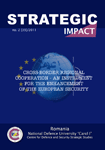NATO’S ENERGY SECURITY: POST-LISBON CHALLENGES
NATO’S ENERGY SECURITY: POST-LISBON CHALLENGES
Author(s): Gabriela Tranciuc, Costinel AnuţaSubject(s): Environmental and Energy policy, Security and defense, Military policy, EU-Approach / EU-Accession / EU-Development, ICT Information and Communications Technologies, Peace and Conflict Studies
Published by: Carol I National Defence University Publishing House
Keywords: energy security; NATO; EU; energy infrastructure; military capabilities; early warning; intelligence fusion; cyber attacks;
Summary/Abstract: Within an extended approach on national security - where the energy turns out to be an essential topic - NATO’s relevance for the energy security domain is becoming controversial and caught between two debates – a political one, centred on the Alliance’s role in countering the policies of some states in this field, and a military one, focused on critical infrastructures protection. On the other hand, NATO’s strategic and institutional transformation – the political-military consultations and intelligence sharing network, crisis management instruments, international and regional cooperation – represent a few substantiations converging towards supporting NATO’s relevance for the energy security domain. Meanwhile, the recent turmoil from Middle East and Northern Africa, as well as the development of Stuxnet-like applications – able to sabotage industrial systems - are emphasizing the NATO’s comparative advantages within the network of international organisations sharing concerns regarding energy security domain.
Journal: Strategic Impact
- Issue Year: 2011
- Issue No: 39
- Page Range: 119-126
- Page Count: 8
- Language: English

